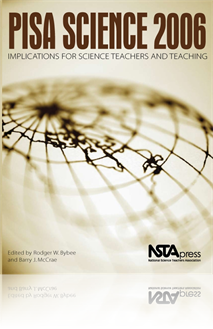All Book Chapters
Book Chapter
What Science Do Students Want to Learn
A major innovation in PISA 2006 was that many of the science units contained one or two questions designed to assess students' attitudes toward science—in particular, students’ interest in learning about specific science topics. In addition, the ...
Book Chapter
Teaching and Learning Science: PISA and the TIMSS Video Study
Scientific literacy was the main focus of PISA in 2006, and a number of items on the student questionnaire asked students how frequently they experienced certain teaching and learning activities, or teaching styles, in their science classrooms. This ...
Book Chapter
Seeing the U.S. Education System Through the Prism of PISA
For some countries, results from PISA have been disappointing but at the same time, PISA also shows that strong performance, and improvement, is possible. Many countries display strong overall performance while some countries show that success can be...
Book Chapter
Teaching Science to Achieve Scientific Literacy
Historically, the study of the sciences as part of schooling was first introduced in the senior or last years of secondary schooling for the express purpose of assisting those students who wished to embark on science-based courses of study at the uni...
Book Chapter
PISA 2006: An Assessment Framework for Scientific Literacy
The PISA 2006 definition of scientific literacy had its origin in the consideration of what 15-year old students should know, value, and be able to do as a preparedness for life in modern society. The results of PISA Science 2006 provide important in...
Book Chapter
Designing a Science Curriculum to Enhance Students' Scientific Literacy
Over the past two decades or so, the term scientific literacy has become prominent in discussions of the school science curriculum and proposals for improving it. If improving students' scientific literacy is to become the central aim of the school s...
Book Chapter
Assessing PISA 2006 Scientific Competencies
This chapter begins by considering what is meant by scientific literacy and how the PISA 2006 scientific competencies encompass basic components of scientific literacy. Then it describes some examples of how these competencies are assessed in PISA 20...
Book Chapter
Scientific Literacy: Implications of PISA Science 2006 for Teachers and Teaching
In the first part of this chapter, the authors briefly review the notion of scientific literacy, emphasize its central focus in the PISA 2006 survey, highlight the overall test performance of countries and students, and make some observations about t...
Book Chapter
PISA 2006: Test Development and Design
In PISA 2006 three subject domains were tested, with science being the major domain for the first time in a PISA survey and reading and mathematics being minor domains. This chapter first describes the process by which the PISA consortium, led by the...
Book Chapter
PISA: Frequently Answered Criticisms
Studies such as PISA are routinely criticized by educational commentators—particularly when the results are not consistent with their preconceived ideas about the relative merits and efficiencies of various educational practices and systems. This c...
Book Chapter
PISA Science 2006: International Results
Throughout the world education authorities want to know the capacities that their students develop during their formative years in schools. They want to know to what extent students have learned fundamental scientific concept and theories and how wel...
Book Chapter
Knowledge of and About Science
An intuitive and common sense understanding of a science assessment would be that it aims at measuring students' knowledge of and about science. The aim of PISA is to assess to what degree students can apply their knowledge in contexts of relevance t...
Book Chapter
What Scientific Knowledge Remains When the Rest is Forgotten?
The PISA 2006 definition of scientific literacy encompasses three competencies—identifying scientific issues, explaining phenomena scientifically, and using scientific evidence. The results for scientific literacy show clearly that some countries h...
Book Chapter
What Lies Behind Finnish Students' Success in PISA Science?
Finnish students' performance in the PISA scientific literacy assessment has been excellent, and even improved between the three-year cycles of PISA measurements. It is not easy to explain the good results, but this chapter focuses on several factors...
Book Chapter
Overcoming Challenges and Succeeding in PISA Science 2006
Despite the absence of a national science curriculum and the inevitable differences in science curriculum across Canada, Canadian students ranked third in the world on the PISA 2006 science assessment. This chapter presents three possible explanation...


